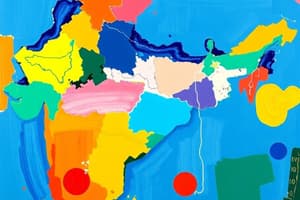Podcast
Questions and Answers
Which civilization created a calendar based on 365 days tied to the annual flooding of the Nile?
Which civilization created a calendar based on 365 days tied to the annual flooding of the Nile?
- Babylonians
- Chinese
- Sumerians
- Ancient Egyptians (correct)
The lunar cycle is approximately 30 days long.
The lunar cycle is approximately 30 days long.
False (B)
What year did Julius Caesar set the duration of the year to 365 days and 6 hours?
What year did Julius Caesar set the duration of the year to 365 days and 6 hours?
46 B.C.
The Gregorian calendar was introduced by _____ in 1582.
The Gregorian calendar was introduced by _____ in 1582.
Match the following calendars with their descriptions:
Match the following calendars with their descriptions:
How many days did the earliest ancient Roman calendars commonly have in each month?
How many days did the earliest ancient Roman calendars commonly have in each month?
February originally had 30 days in the ancient Roman calendar.
February originally had 30 days in the ancient Roman calendar.
What was the main reason the Babylonians based their calendar on 360 days?
What was the main reason the Babylonians based their calendar on 360 days?
Which day of the week is named after the Roman god of war?
Which day of the week is named after the Roman god of war?
Saturday was named after the Roman god Jupiter.
Saturday was named after the Roman god Jupiter.
What does the Latin term 'Dies Solis' refer to?
What does the Latin term 'Dies Solis' refer to?
Friday is named after Venus, the god of __________.
Friday is named after Venus, the god of __________.
Match the following months with their meanings:
Match the following months with their meanings:
Which day of the week is derived from the Germanic god Thor?
Which day of the week is derived from the Germanic god Thor?
What is the origin of the name for the month July?
What is the origin of the name for the month July?
Flashcards are hidden until you start studying
Study Notes
The History of the Calendar
- The Ancient Egyptians were the first to develop a calendar based on a 365-day year.
- Their calendar was based on the annual flooding of the Nile River.
- The Egyptians used sundials to track the sun's shadow, which helped them calculate time and seasons.
- The Egyptians divided the year into 12 months of 30 days each, plus five extra days.
- The Babylonians based their calendar on a 360-day year, which was influenced by their existing mathematics.
- The Babylonians observed that the sun moved through the sky at about 1 degree each day.
- In 46 B.C., Julius Caesar implemented a 365-day and 6-hour calendar known as the Julian Calendar.
- The Julian Calendar added a leap day every four years to account for the extra 6 hours.
- In 1582, Pope Gregory XIII replaced the Julian Calendar with the Gregorian Calendar, which is still used today.
- The Gregorian Calendar accounts for the fact that the year is not exactly 365 days and 6 hours, but is 365 days 5 hours 48 minutes and 46 seconds.
- Leap years remain 366 days long, except for years divisible by 100 but not by 400 (e.g. 2000 was a leap year, but 1900 and 2100 were not).
Days of the Week
- Between the first and third centuries CE, the Roman Empire adopted a seven-day week, replacing their previous eight-day system.
- Sunday was named after the sun in Latin, "Dies Solis," meaning "day of the sun," and later became “Sunnon-dagaz” in Old Germanic.
- Monday was named after the moon in Latin, "Dies Lunae," meaning "day of the moon," and became "Mondaeg" in Old English.
- Tuesday was named for the Roman god of war, Mars. However, in Germanic culture, the god of war was Tiu, leading the English day of the week to be derived from his name as "Tiwsday" and eventually "Tuesday."
- Wednesday was named for the Roman god Mercury. The equivalent Germanic god was Woden, leading to "Woden's Day" in German and "Wednesday" in English.
- Thursday was named after Jupiter, the Roman god of thunder. Later, this evolved to Thor, the Norse god of thunder, and ultimately became "Thursday."
- Friday was named after Venus, the Roman goddess of love. This evolved to Frigg, the Norse goddess of love, becoming "Frije-dagaz" in Germanic and "Friday" in English.
- Saturday was named after Saturn, the Roman god of agriculture.
Months of the Year
- The original Roman calendar had 10 months:
- March: named after the god of war, Mars.
- April: named after the goddess Aphrodite (or Apru).
- May: named after Maia, daughter of Atlas.
- June: named after the goddess Juno.
- July: named by the Roman Senate in honor of Julius Caesar.
- August: named after Augustus Caesar, the first Roman emperor.
- September: comes from the Latin word "septem," meaning "seven," as it was the seventh month in the early Roman 10-month calendar.
- October: comes from the Latin word "octo," meaning "eight."
- November: comes from the Latin word "nonus," meaning "ninth."
- December: comes from the Latin word "decem," meaning "ten."
- When the Romans added two more months to the Julian Calendar:
- January was named after the god Janus.
- February is named after a Roman purification festival called "februa."
Studying That Suits You
Use AI to generate personalized quizzes and flashcards to suit your learning preferences.




